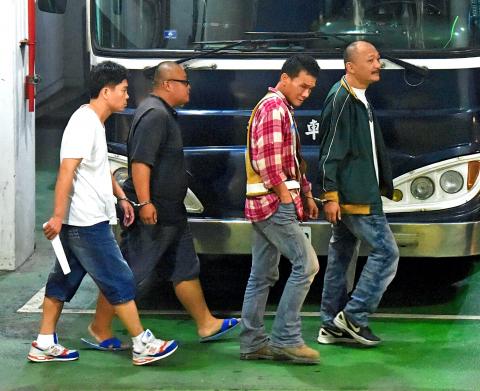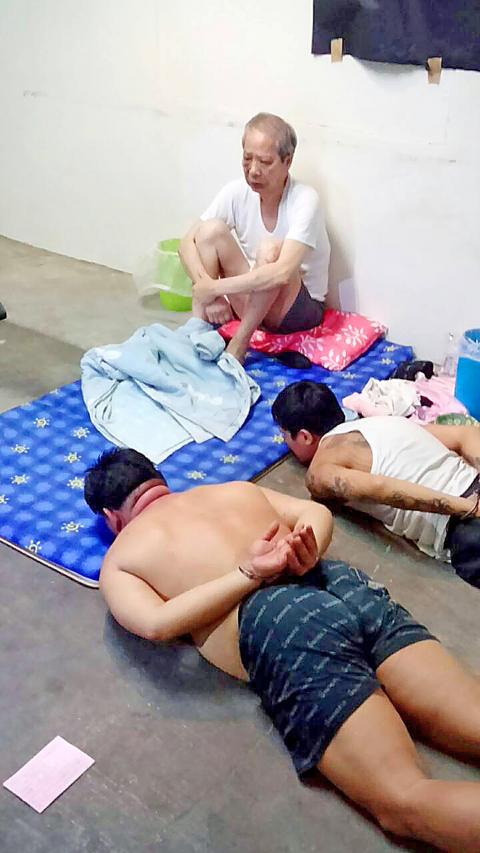Hong Kong tycoon Wong Yuk-kwan (黃煜坤) was said to be in good condition on Tuesday night after a police raid on a house in Yunlin County freed him more than five weeks after he was allegedly abducted in New Taipei City. Authorities said that several suspects are being questioned over the incident.
Wong, chairman of Hong Kong-based Pearl Oriental Oil Group (東方明珠集團), who is also known as Wong Kwan, was seized by two men on Sept. 20 as he was walking to his Sindian District (新店) residence and bundled into a black sedan.
However, his family did not receive a ransom demand until Oct. 17, when they were told to pay HK$70 million (US$9.03 million) in bitcoins, although they were later told to deliver the ransom in cash in Hong Kong, authorities said.

Photo: Chu Pei-hsiung, Taipei Times
Wong’s wife, who is Taiwanese, had reportedly only managed to collect HK$11 million as of Friday last week, because her husband’s assets were frozen by Hong Kong authorities after he was indicted in 2013, along with another Pearl Oriental Oil executive and two more people, on fraud and money-laundering charges in connection with the purchase of an oil field in the US.
Police said no ransom had been paid.
Wong, 67, was found manacled, blindfolded and hidden in a small room in a ramshackle house, where all the windows had been sealed with black cloth, police said.

Photo: Provided by a member of the public
Taipei’s Buddhist Tzu Chi General Hospital yesterday said he was in good condition. Police said he suffered cuts, bruises and cigarette burns on his face and other parts of his body.
Police said 15 suspects have been arrested, including Siwei Village (溪尾村) Warden Tsai Mao-tien (蔡茂典) and two of the ringleaders of the alleged kidnapping: Tsai Wen-li (蔡文力) and Tsai Kuang-chung (才廣忠).
Those three, along with another suspect, Wu Chin-wang (吳金旺), have been detained incommunicado.
Three other suspects were taken for questioning at the Taipei District Prosecutors’ Office.
Criminal investigation police said Hong Kong triad gangsters were most likely the masterminds behind the kidnapping, which they believe might be linked to Wong’s financial disputes and court case in Hong Kong.
Police officials said Wong had reportedly been put under surveillance by triad members after he jumped bail in Hong Kong and flew to Taiwan in February, reportedly for medical treatment.
Two of the people indicted alongside Wong in Hong Kong were convicted earlier this year and sentenced to jail terms. Wong’s case was due to go to court in late May.
A police official yesterday said that Wong entered Taiwan legally, since he has family members in the nation, and there is no international arrest warrant out for him.
Media reports said Wong arrived in Hong Kong from China when he was 18 years old. After finding employment as a chef, he worked his way up to a senior position before investing in stock and real estate. His fortune reportedly began with a hotel deal that earned him HK$1 million.
Additional reporting by AFP

MORE VISITORS: The Tourism Administration said that it is seeing positive prospects in its efforts to expand the tourism market in North America and Europe Taiwan has been ranked as the cheapest place in the world to travel to this year, based on a list recommended by NerdWallet. The San Francisco-based personal finance company said that Taiwan topped the list of 16 nations it chose for budget travelers because US tourists do not need visas and travelers can easily have a good meal for less than US$10. A bus ride in Taipei costs just under US$0.50, while subway rides start at US$0.60, the firm said, adding that public transportation in Taiwan is easy to navigate. The firm also called Taiwan a “food lover’s paradise,” citing inexpensive breakfast stalls

TRADE: A mandatory declaration of origin for manufactured goods bound for the US is to take effect on May 7 to block China from exploiting Taiwan’s trade channels All products manufactured in Taiwan and exported to the US must include a signed declaration of origin starting on May 7, the Bureau of Foreign Trade announced yesterday. US President Donald Trump on April 2 imposed a 32 percent tariff on imports from Taiwan, but one week later announced a 90-day pause on its implementation. However, a universal 10 percent tariff was immediately applied to most imports from around the world. On April 12, the Trump administration further exempted computers, smartphones and semiconductors from the new tariffs. In response, President William Lai’s (賴清德) administration has introduced a series of countermeasures to support affected

CROSS-STRAIT: The vast majority of Taiwanese support maintaining the ‘status quo,’ while concern is rising about Beijing’s influence operations More than eight out of 10 Taiwanese reject Beijing’s “one country, two systems” framework for cross-strait relations, according to a survey released by the Mainland Affairs Council (MAC) on Thursday. The MAC’s latest quarterly survey found that 84.4 percent of respondents opposed Beijing’s “one country, two systems” formula for handling cross-strait relations — a figure consistent with past polling. Over the past three years, opposition to the framework has remained high, ranging from a low of 83.6 percent in April 2023 to a peak of 89.6 percent in April last year. In the most recent poll, 82.5 percent also rejected China’s

PLUGGING HOLES: The amendments would bring the legislation in line with systems found in other countries such as Japan and the US, Legislator Chen Kuan-ting said Democratic Progressive Party (DPP) Legislator Chen Kuan-ting (陳冠廷) has proposed amending national security legislation amid a spate of espionage cases. Potential gaps in security vetting procedures for personnel with access to sensitive information prompted him to propose the amendments, which would introduce changes to Article 14 of the Classified National Security Information Protection Act (國家機密保護法), Chen said yesterday. The proposal, which aims to enhance interagency vetting procedures and reduce the risk of classified information leaks, would establish a comprehensive security clearance system in Taiwan, he said. The amendment would require character and loyalty checks for civil servants and intelligence personnel prior to